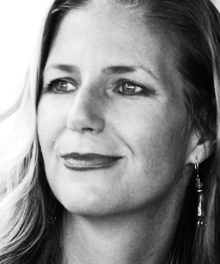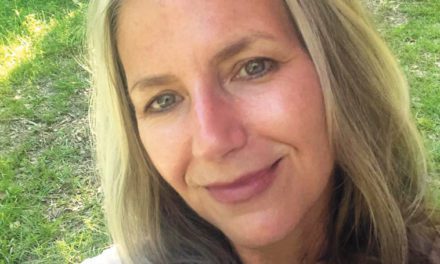 By Margaret Evans, Editor
By Margaret Evans, Editor
I was driving to the Y the other day when a conversation on NPR caught my attention. The show was On Point, the interview was just starting, and I actually passed the Y and drove around Port Royal for a while, just listening, because I couldn’t believe my ears.
The woman chatting with host Meghna Chakrabarti seemed to be channeling my own deepest thoughts and feelings – almost like she’d read my mind – but she was doing it with such eloquence and humor, and with courage I can seldom muster. Ideas I tend to dance around and sugarcoat for fear of causing offense? She was saying them right out loud, with confidence and force, while still remaining . . . delightful. It was extraordinary! Who was this woman and where had she been all my life?
Well, one only budgets so much time for the daily workout, and eventually I had to get to the Y. But I vowed to revisit the conversation later. Fortunately, On Point posts their interviews online.
Chakrabarti’s guest was Irshad Manji, author of a new book called Don’t Label Me: An Incredible Conversation for Divided Times. Those of you who read me regularly know I’ve been obsessed with this topic for years, and if you’re totally bored by now, I get it – feel free to turn the page. But I believe this is the great issue of our day – the one that feeds into all the others – and until we get a handle on it, I will probably remain obsessed. If you think our “divided times” are all about Donald Trump – that if we could just get rid of him, everything would be hunky dory – chances are you haven’t been obsessed for years, like yours truly. (Good! Obsession’s unhealthy.) As a “divided times” aficionado, I contend that the great divide came long before Trump. In fact, I believe Trump rose directly from that divide as sure as the creature rose from the black lagoon.
But don’t take it from me, your friendly neighborhood centrist. Take if from Irshad Manji, a progressive Muslim lesbian living in Canada and self-proclaimed “champion of diversity.”
Manji believes that the diversity movement, itself – her own movement – is largely responsible for the dangerous divisions now rending this country apart.
“We’re labeling ourselves to the point of extinguishing our own humanity,” she says. “We criticize the early founders for taking humans and slicing them up into categories, and assigning values.” (Women, for instance, who were basically the property of their husbands. And blacks, who were considered 3/5 human, a concept once enshrined in our very constitution.)
“But today’s diversity enthusiasts are making the same stale mistakes. With our constant labeling, we’re doing the exact same thing – creating a hierarchy of worth. And at the bottom of that hierarchy are straight white men.”
She cites a recent Free Speech debate between public intellectuals Michael Eric Dyson and Jordan Peterson – one that went viral on YouTube – during which Dyson called Peterson, “a mean, mad white man.” Peterson responded, “You don’t know anything about my background or where I came from, and it doesn’t matter to you, because fundamentally, I’m just a mean white man. That’s a hell of a thing to say in a debate.”
Manji’s take on this encounter? It was a mistake on Dyson’s part. And not simply an honest misstatement, either. Given an opportunity to rephrase his remark – or address Peterson’s ideas instead of his identity – Dyson instead repeated himself. Doubled down. He wrote Peterson off as a “mean, mad white man” again, to lots of audience applause.
“How does that not amount to racial reductionism?,” Manji asks. “Racial profiling? How is that acceptable? It’s notacceptable to do it to anybody else. Why is it acceptable here?”
According to Chakrabarti, it’s acceptable because… history. Straight white men have always had the power and other groups have been marginalized. “Isn’t turnabout fair play?” she asks.
Manji responds with a question that I’ve asked a thousand times, if only in my head: “How is payback progress?”
How, indeed, especially if payback sets you back, instead of moving you forward. The old childhood adage comes to mind: Two wrongs don’t make a right.
Manji believes that “diversity practiced as labels” is not true diversity – especially not if it’s about destroying one hierarchy simply to set up another. “Somebody like me who’s triply ‘disadvantaged’ historically is at the topof the new hierarchy,” she says, referring to her female, Muslim, and lesbian identities. It may be new, but it’s still a hierarchy. Still a power structure.
She says the diversity movement should be more honest about its own power, which is formidable. While researching her book, she encountered many Americans in the South and Midwest who asked her questions like, “Why are people in ‘your crowd’ so comfy calling us names like racist, homophobe, misogynist,when they don’t even know us?” Over the past 15 years or so, says Manji, people in these regions have felt humiliated by this name-calling, shamed by these labels they don’t claim, angry at being branded as something they know they’re not. To millions of “regular Americans,” she says, it’s the “coastal elites” who have the power – the power to shape the narrative, the power to distort who they are and how they’re seen by the world.
“We need to understand how power is distributed,” says Manji. “It’s not just white guys who have it anymore. We, too, have power here on the liberal left.”
About the shaming and name-calling, Meghna Chakravarti brings up what she calls “the elephant in the room,” saying, “Doesn’t Donald Trump do all that?”
Absolutely!, says Manji. But that’s no excuse for the rest of us to do it.
“We legitimize his shaming by reacting to it with shaming of our own,” she says. “And then it becomes a vicious cycle. So how can we say we’re all that different from him when we don’t behave all that differently from him?”
(At this point in the interview I was practically in tears. When somebody so smart and lovely and legit – i.e. way up in the ‘new hierarchy’ – says what you’ve been trying to say – but failing to communicate – for such a long time, it’s a rather moving experience. I had to take a moment, rewind the recording and listen again.)
Manji got plenty of pushback from the NPR listeners, who seriously didn’t want to “go there” with her. One man called in and said that people like Jordan Peterson deserve to be “shamed into oblivion.” (His argument had something to do with the locker room talk that white men engage in, and, from what I heard, absolutely nothing to do with Jordan Peterson.) Meghna Chakrabarti was also pretty skeptical. She pointed to a recent John Oliver segment in which Oliver argued that not all public shaming is wrong . . . that righteous indignation can make the world a better place.
Manji responded that, indeed, some righteous indignation is merited. “But in our culture of casual cruelty,” she said, “all we’re really hearing anymore is righteous indignation. You don’t change people by insulting them and berating them. You do it by engaging them. By listening to them. And by listening to learn, not just to win.”
(Preach, my sister!)
Chakrabarti, still not sold: “I hear your call for a more open dialogue between individuals. But what about the systemic challenges we face?”
Manji: “I hear that question all the time, but I have not yet heard a compelling answer to this question. Since systems and structures are made up of people, how do they change if the people themselves, who inhabit them, don’t change?”
(Right?! It’s like we were mind melding . . . )
There was so much more to love about this interview – for instance, Manji believes that true diversity must start with diversity of viewpoint, otherwise “it’s just a shtick” – but I’ve run out of space. I hope you haven’t run out of curiosity, though. You can find the whole interview between Meghna Chakrabarti and (my new bestie) Irshad Manji at www.npr.org/podcasts.





